Last July, a mere 27 days after arriving in Portugal, I fell in love with 3000 square meters of land.
At the time my mother, back in Illinois, had suffered what doctors thought was a stroke. Since I had entered the country on a temporary visa with limited exits/re-entries allowed, I couldn’t go back to see her.
One evening, trying to take my mind off the situation, I pulled up idealista—a Portuguese real estate website, and I began looking at houses in the countryside.
I grew up on a farm in rural northwestern Illinois. It wasn’t a fully functional farm with acres of seed corn and soybeans and monstrous tractors with tires the size of a small house. It was my dad’s hobby farm—1.5 acres of country packed with his goats, my mom’s chickens, a hodgepodge of ponies and horses (and one donkey named Jackie) belonging to my sister and I, a kennel full of beagles and a dizzying array of farm cats.

The sizable garden was packed full of Dad’s favorites: sweet corn, potatoes, and big fat tomatoes that tasted like summer straight off the vine—red skin warm to the touch, taut with sunlight.
My childhood there was idyllic. I roamed barefoot through the summers, hair strung with leaves, hiding in trees to avoid my mother’s chores, and drinking cold, sweet water straight from the well.
Though I never would have imagined it as a child, I grew up to love living in cities. First Chicago and then San Francisco. I loved the hum and bustle of urban life, the ease of walking out your door to buy groceries or dinner mere moments from your house. I loved the feeling of being connected to something bigger that was going on—because in a city, something is always happening somewhere.
Marido and I met in Chicago and spent most of our time in and around the city. But some weekends when we were dating I’d take him two hours west to my parents’ farm. He’d laugh at the way I transformed into a farm girl the minute the tires hit the gravel road. I’d be climbing fences and slinging bales of hay with ease, unbothered by the goat shit wedged in the treads of my platform shoes. For me, country and city could co-exist in my heart with ease.
But a few years ago after 20+ years of city living, I began feeling the itch for something quieter and less crowded. By 2020, an idea of a dream got stuck in my head, one that took shape when we first started talking about a transatlantic move.
I wanted space. I wanted the sound of wind whispering through the trees. I wanted light-dappled grass and sun-warmed paving stones. I wanted fruit trees and birdsong. A place where I could putter around in the yard without six sets of neighbors peering out their windows to see what I was up to.
I knew exactly what I wanted, but I wasn’t sure it was possible. I wasn’t sure what life in the Setúbal countryside might actually look like.
At first, I called the thing I was looking for a “villa.” As in, “maybe we’ll find a run-down old villa that we could fix up, have guest quarters, invite our friends to come stay for months at a time.” Then I realized that villa wasn’t the right term. I was thinking of a place in the country, perhaps an acre or two surrounded by a stone wall. In Portugal, that place is called a “quinta.”
Quinta is a traditional term for a rural estate, although a quinta can also be a walled-off mansion in a city center or an acreage that was once used for agriculture but has since been converted to residences.
So I scrolled through quinta-style listings on idealista, looking for something that was more a feeling than a photograph. I perused thousands of square meters—some properties that were little more than mossy-walled ruins and others that were far too shiny and stark to be comfortable.
And then a spray of bougainvillea stopped me in my tracks.
I clicked through photos of a house the real estate agency labeled not a quinta but a “country house,” with just under one acre of land. Everything I saw, I loved. The ceiling beams in the blue and white tiled kitchen. The way the light traveled across rooms. The touches of handmade wood in every doorway. The warm red terra cotta patio. The fruit trees: lemon, orange, persimmon, plum, loquat. The tall trees guarding the perimeter and the exuberant bursts of flowers and foliage everywhere I looked.
In our months of cyberstalking Portugal from afar, when COVID had us all locked down and unable to travel, I became a skilled Google Earth sleuth. So it was simply a matter of locating a couple of landmarks and I could find the property in real life. Just a few days after I first saw it online, I piloted my scooter down a washed-out gravel road and sat for a moment outside the gates while the guard dogs within let me know that lurking would not be tolerated.
My heart was pounding from the adrenaline of not dumping my scooter in the mess of a rural road I had just traversed and from the high of seeing something in real life that previously existed only in pixels. I wanted to reach out and touch the smooth stone wall that tucked itself around the property on all sides. I wanted to examine the painted tile announcing the property’s name, “Oliveira do Paraiso.” I wanted to scale the green iron gates and make myself at home. I wanted so much.
But I flung a leg back over my bike and headed back over the hills to our flat in Setúbal. I knew I had to put this country place out of my mind. For one thing, we hadn’t even been in Portugal for one month. Our plan was to wait longer—a year, at least, before landing a permanent dwelling. And another thing—I might be a country girl at heart, unbothered by goat shit and etcetera. But Marido wasn’t.
So I shoved the idea somewhere dark and deep and focused on the job at hand—settling in to our new lives in Portugal.
A couple of months later, though, the topic of a more permanent home resurfaced. We bought our flat in a historic neighborhood of town sight unseen, with the idea that it would be a good place to start out, to get our bearings, and later to rent it out.
We liked the flat well enough, but we were discovering that the neighborhood was loud on a whole different level of what we were accustomed to in our city living back in the US. Situated on a picturesque little square with a cafe out front and an abundance of restaurants nearby, our location was a prime spot for night life.
It wasn’t just the hookah club up the street with its bass beats pumping out into the small hours of the night. It was also summer crush of tourists who pour into Setúbal in July and August—from Lisbon, from the EU, from all over the place. After collecting sun all day at the beaches in Arrábida or over on the Tróia peninsula, they come to our street looking for dinner and drinks and tall tales with friends.
The majority of buildings in Portugal are constructed of stone or cement. And when the music gets thumping and motorbikes rev their engines and shouts ring out to hail a friend—it echoes. The decibels ricochet back and forth from one street to the next and no amount of double-paned glass can shut it all out.
The noise was one strike, and the complete lack of our own outdoor space was another. We had a yard in San Francisco—it wasn’t huge and it wasn’t private (our elderly next door neighbor, Gus, was constantly peering over the fence to see what we had done with the lawn). But it was ours, and Filha and our dog Vila were both used to accessing the yard whenever they wanted. Marido was used to grilling out, and I was used to plunging my hands in the soil for some plant therapy whenever the general stress of life got dialed up too high.
When Marido mentioned that he had been occasionally trawling idealista looking at properties for a more permanent home for us, I sat up and took notice. I grabbed my laptop and pulled up the bookmark for the country house with the amazing bougainvillea—Oliveira do Paraiso—which I hadn’t managed to fully banish from my brain. It was still there. Still unclaimed.
I turned the screen toward Marido, trying to be casual: “Maybe we should look at this place?”
He wasn’t fooled. “You mean the country house out by Palmela that you’re completely obsessed with?” he asked. He’s known me for a long time.
Here’s the thing about Marido and I. When we go shopping, I walk into a store, see a thing I like, decide to get it, buy it, and I’m done. He walks into a store, browses around, finds something he likes, thinks about it, puts it back down, goes home and looks it up online, searches four more stores for a good deal. And then, maybe, he’ll actually buy it sometime.
So he was wise to be alarmed that I was jumping on a house search. “Remember, we’re not in a hurry,” he cautioned.
And we weren’t. At least, I tried not to be. We rang up our friend Elda, the real estate agent. She took us to see a house with a pool in Azeitão and a place with a yard on the edge of town in Setúbal whose owner, an elderly woman, plied us with cookies and wine after our house tour. We sent Elda other places we found online and she advised us for or against them. And one day in early October, she set up a tour of Oliveira do Paraiso.
I knew I was in trouble before I walked through the gate. I had been looking at photos of this property for three months already, and I was emotionally attached. But something happened when I finally set foot on the land, when I stood in the house, when I listened to the trees. Something visceral, something electric.
I stood there and I knew I was home.
I’ve never felt that way about a physical place before, not really. I have loved homes that I’ve lived in; I’ve made them mine. I’ve felt nostalgia when I’ve returned to a place and I’ve felt at home in all sorts of postal codes.
But never before have I looked at a property and known, with a vibration through every bone in my body, that this was where I belonged.
I’ll spare you all the intricate details of what happened next and just hit the high notes:
Yes, Marido liked Oliveira do Paraiso too, although he didn’t feel the vibrations in his bones.
He also wasn’t sure how he felt about moving out of town where you can walk to dinner, drinks, and the beach to a place where your next-door neighbors are a bunch of sheep.
The listing price was reasonable but a bit more than what we’d planned to spend.
We visited the property a second time, three days after our first visit. This time we brought along a contractor friend to inspect all the important parts; we also brought Filha, who hadn’t seen it yet and whose opinion mattered no small amount; and we brought our two dear friends from the States, Michael & Andrew, who had literally just flown in that afternoon for a visit but were kind enough to take a real estate tour while 100% jet lagged.
All reports were favorable: contractor, Filha, Michael & Andrew all gave us the thumbs up.
I was (obviously) ready to make an offer the minute I stepped onto the property, but Marido needed more time to think and to weigh the pros and cons of town life vs. country life.
After several days of discussion, we decided to make an offer. We came in €15k less than the asking price.
The owner wanted to negotiate. So we did. And we did it in person.
I’m going to jump out of the bullet points here, because that last one is kind of a big deal and deserves a higher word count.
When you buy property in the States, you never see the seller. Your agent writes your offer, the seller accepts or counters or declines, and it’s all done via emails and phone calls and signatures on Docusign. It’s all very efficient and impersonal and honestly kind of weird for such a huge—and often very emotion-laden—purchase.
In Portugal, when you sign a promise contract or deed to buy a property, you do it in person. The buyer and the seller and their attendant agents or lawyers or official personages all sit down at a table and slide the paperwork back and forth and lay down their signatures together. It feels very, I don’t know… human. It feels human.
When the owner (Senhor A) of Oliveira do Paraiso wanted to negotiate, we went back to the property with Elda. We all sat down around a picnic table in his yard and we talked about the situation—why we offered what we offered, why he set the price for the property where he set it, and what number we might agree on to make a deal.
It was all very civilized, although tears were shed more than once—mine, when I tried to describe how I felt about the property; and Senhor A’s, when he tried to find words to explain how much of himself he put into the place.
Senhor A lived at Oliveira do Paraiso for 23 years. When he bought the property, it was home to just one tree—the olive tree for which the property is named. All the other trees he planned and planted; the gardens, the lawn, the meandering paths and charming wooden gates—they are all his doing. Spend a few minutes exploring and you can tell how much love he poured into the land, the house, the trees.
But age has come for Senhor A, as it does for all of us. Four years ago, he told his son that he knew his time at Oliveira do Paraiso was coming to an end. He knew he would have to sell it. All throughout 2021, he let strangers come in his gate and wander through his home, commenting on the fixtures, the floor, the light. They inspected his handiwork and, unknowingly, his heart. Other offers had been made at different times. But he was hoping ours would work out. He could see that I had fallen in love, and he’d feel so much better about selling his home to someone who truly loved it.
Marido and I walked away from the bargaining table without an agreement—we needed to talk. And we did, in circles, for hours. We talked about his reservations about moving out of Setúbal proper, even if it was just 15 minutes away. We talked about what it would mean to pull extra money out of savings to meet Senhor A’s asking price. We talked about what we wanted from a home, from a way of living. We talked and talked and talked. I knew my heart was too involved, I had no logic to lay on the table. Fortunately, Marido is very good at logic, so all our bases were covered.
In the end, we decided to do it. To meet Senhor A’s price, to take one more risk in a series of risks that began when we decided to move to this country. There was logic in our decision, sure, but there was mostly love.
“I know how much you love the place,” Marido told me. “And I love you. So let’s do it.” Seriously the most romantic thing in the history of romantic things.
On November 6 we signed the Contrato Promessa, and for three long months I’ve been crossing my fingers, knocking on wood, and holding my breath. Because the deal’s not really done until it’s done. You never know what can go wrong.
But on February 4 we signed the deed, we got the keys, and we stopped by Filha’s school in the middle of the day to surprise her so we could all go together to turn the key in the door of our new home for the first time.
This week the painters are coming, and we still have boxes to pack. But I’ve moved all our plants to their new home, and they’re settling in nicely.
We’ve met the neighbors across the road—an adorable older couple who wear matching galoshes to tend their orange grove. To the north lives a friendly fuzzy-eared donkey whom Filha calls “Dandelion,'“ and our neighbor to the south is an ostrich whose temperament remains suspect:
On all sides we’re surrounded by sheep with bells around their necks, often out grazing the roadsides under the watchful gaze of their shepherd and sheepdog.
Every afternoon around 3pm, a pair of rose-ringed parakeets fly in, announcing their arrival with swoops and shrieks. They make for a row of trees at the back of our property and perch there for half an hour or so to eat the yellowish nuts that hang from the trees before screeching away to their next neighborhood buffet.
The day after we got the keys, Senhor A stopped by with his son, who translated for three hours as we got the full history of the property. Senhor A told us all the important bits we need to know—how the water filtration system works, where to turn on the gas, how to make sure the network of irrigation hoses do their job properly.
He told us, also, the names of all the trees. He told us why he planted this one (for the sweetest clementines) and that one (for the lovely shape of the shade). He told us that the beam used for the mantel above the fireplace and the lintel for the hallway door came from a castelo in Lisboa. He told us stories that he wants us to remember.
As he was leaving, he pulled me aside by the gate and brushed his worn hand over the tiles that bear the name of the property we both love.
“All my life,” he said in halting English, “I have written poems. But this one—Oliveira do Paraiso—this one is my best poem.”
Now this dream, this poem of a property is ours to love. Lucky for Senhor A, I write poetry too. And I am honored and delighted to care for and carry on his work.

Copyright © 2022 LaDonna Witmer




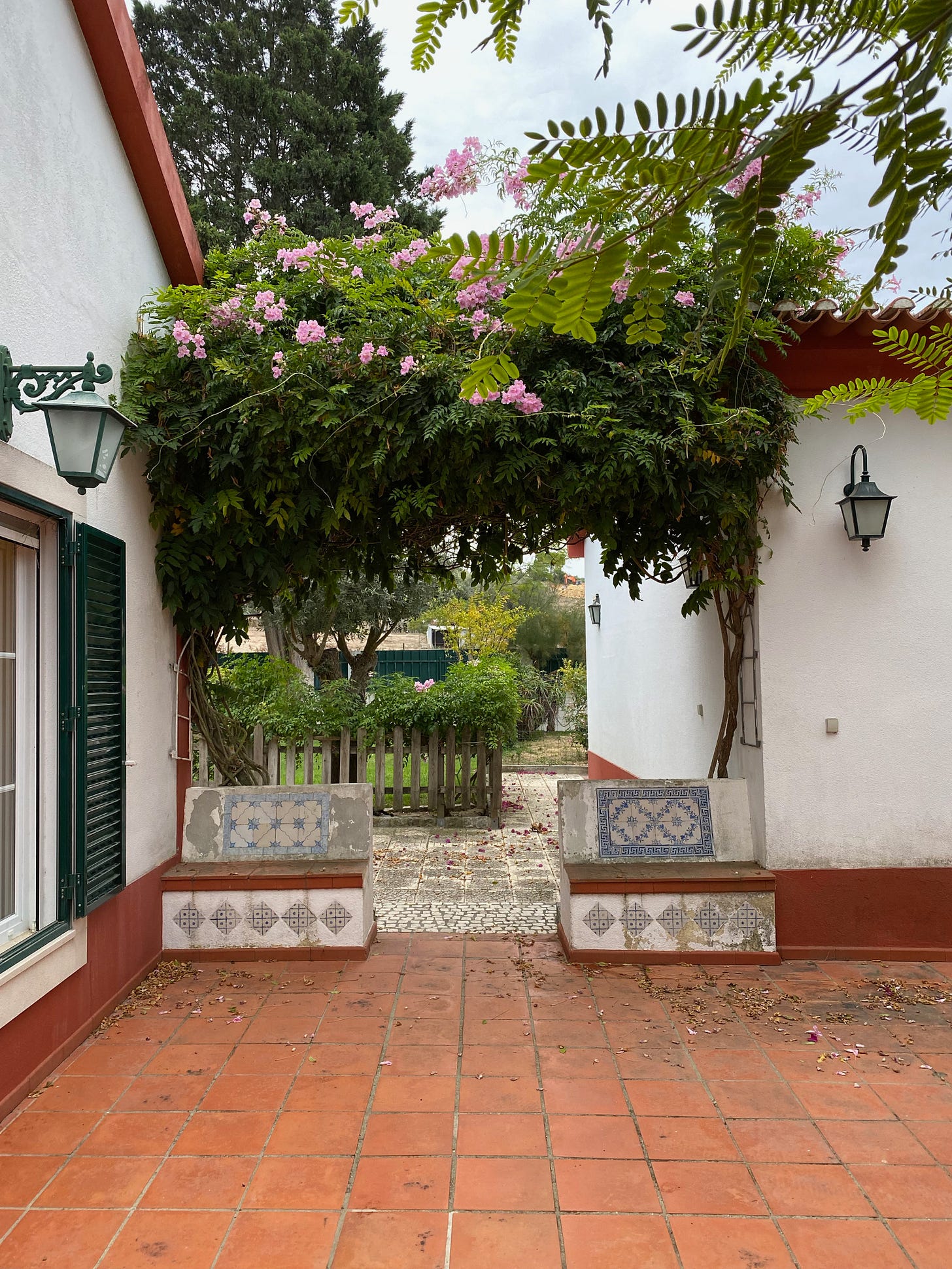

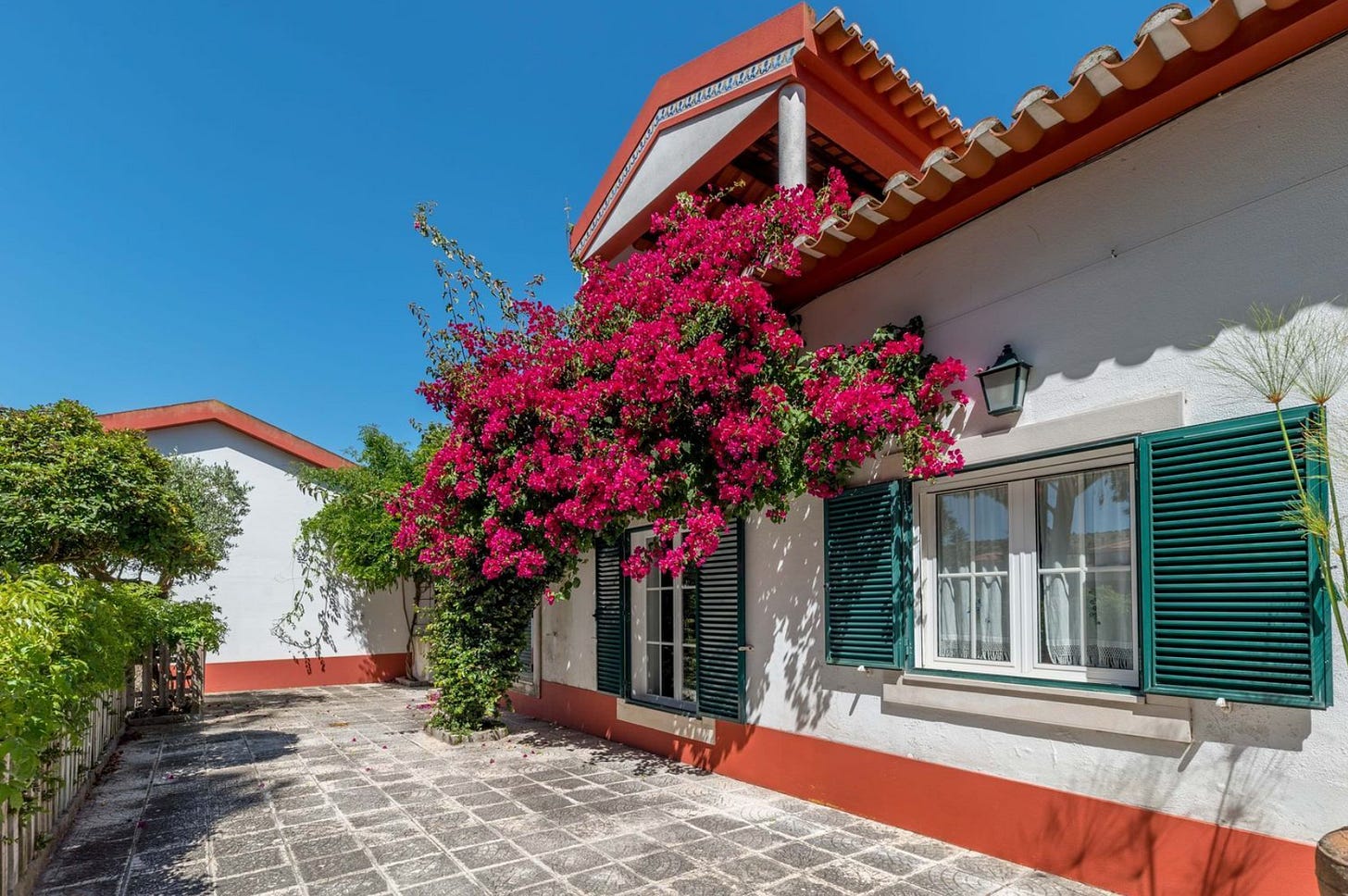
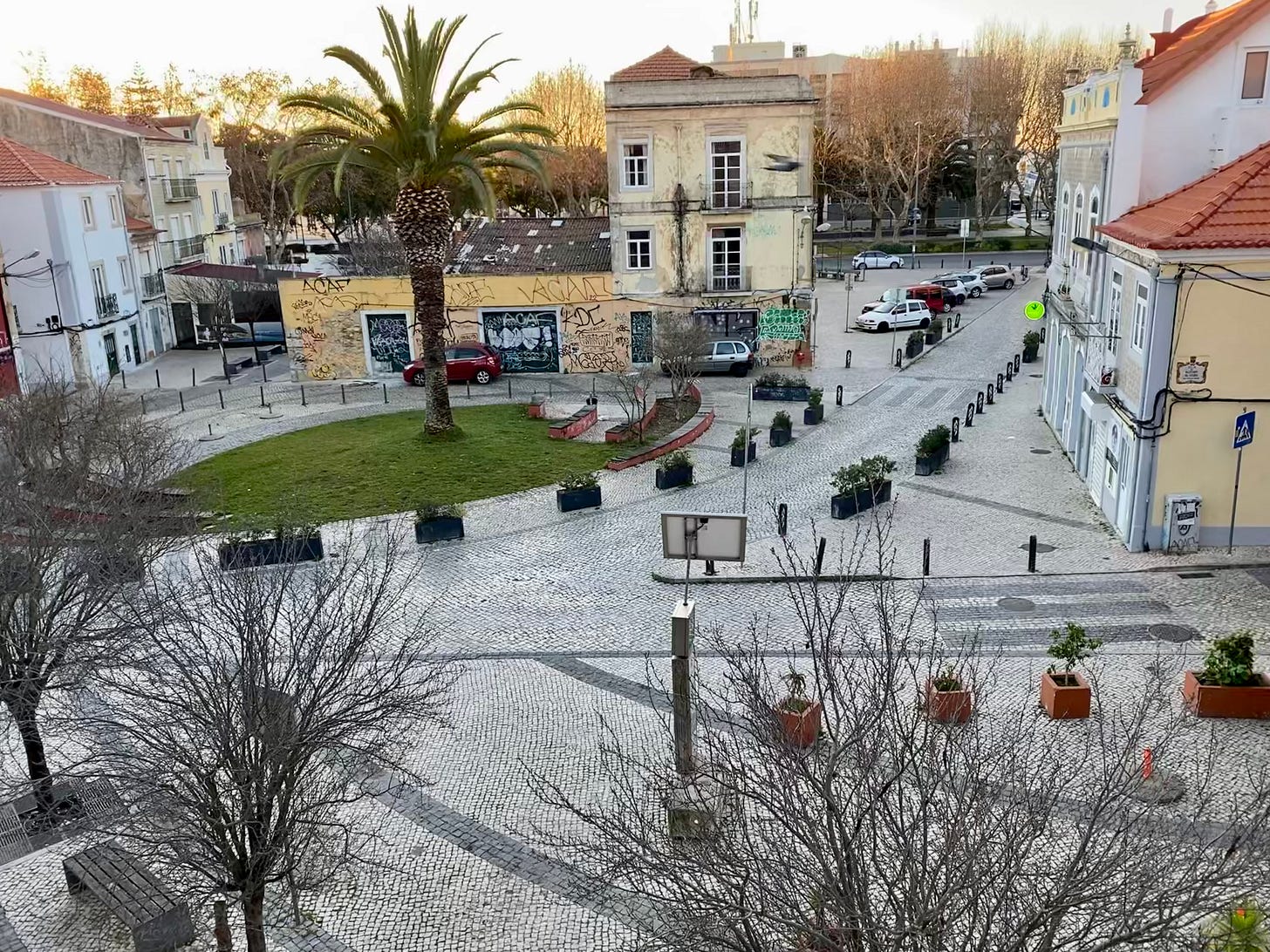

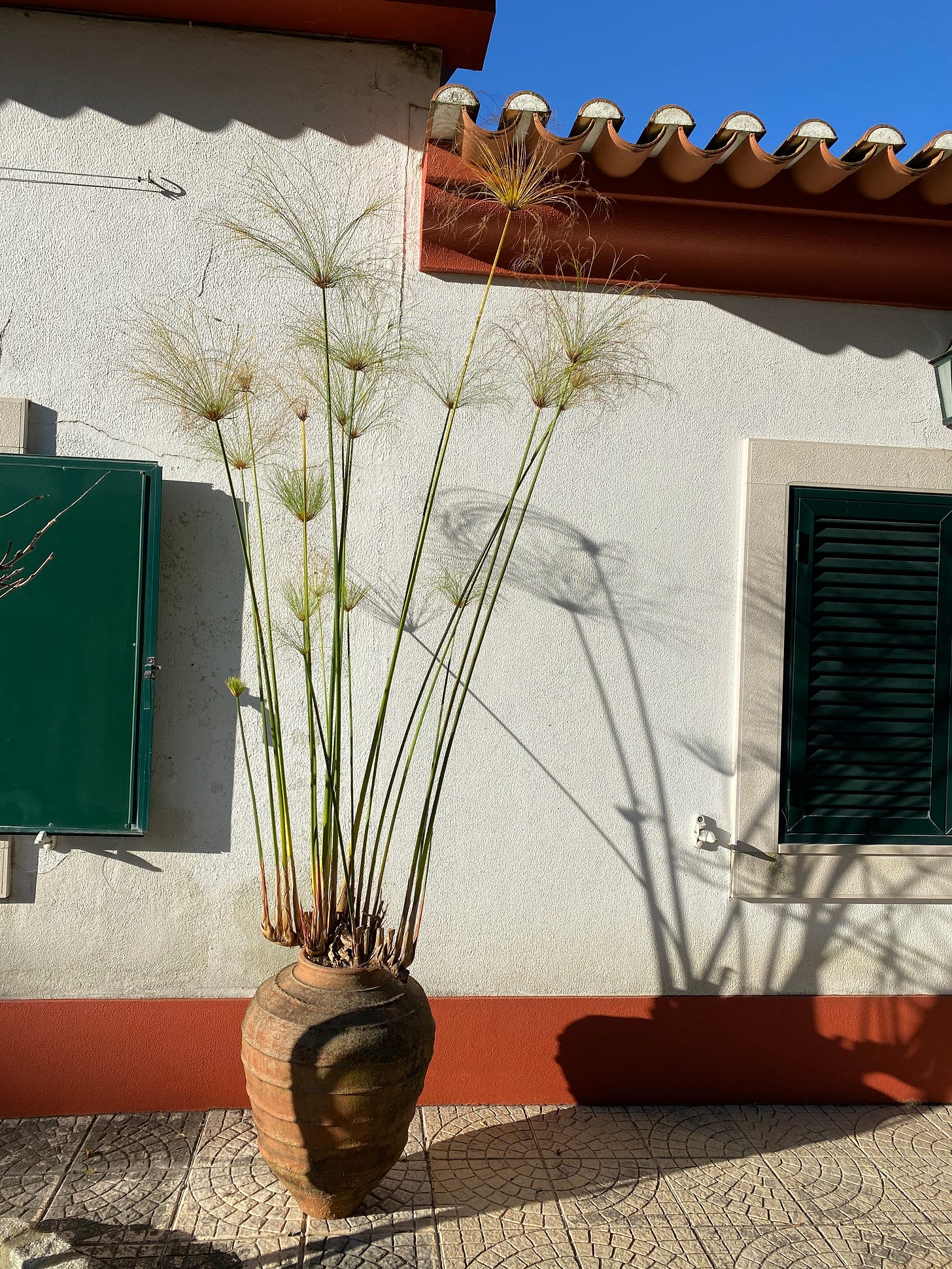

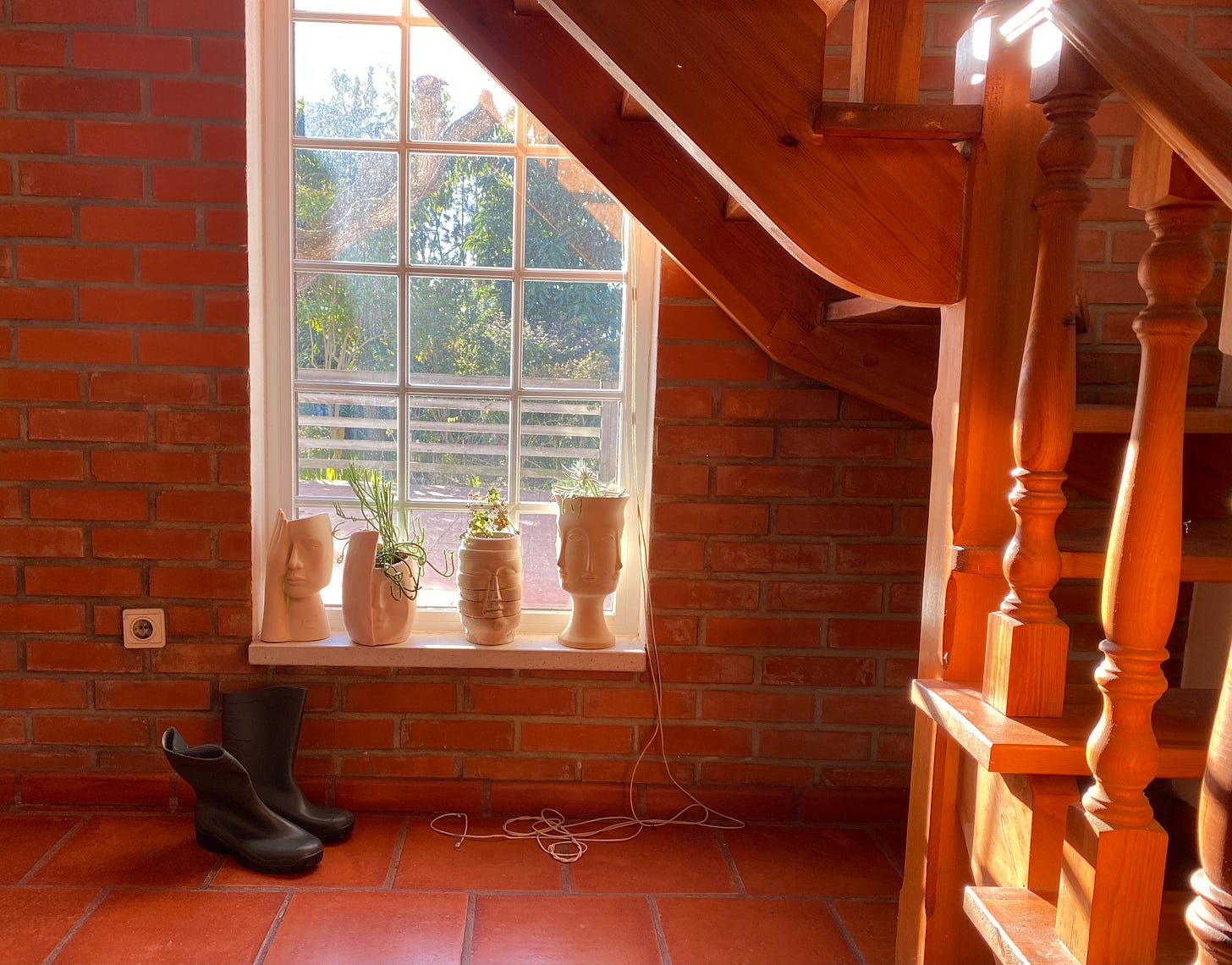
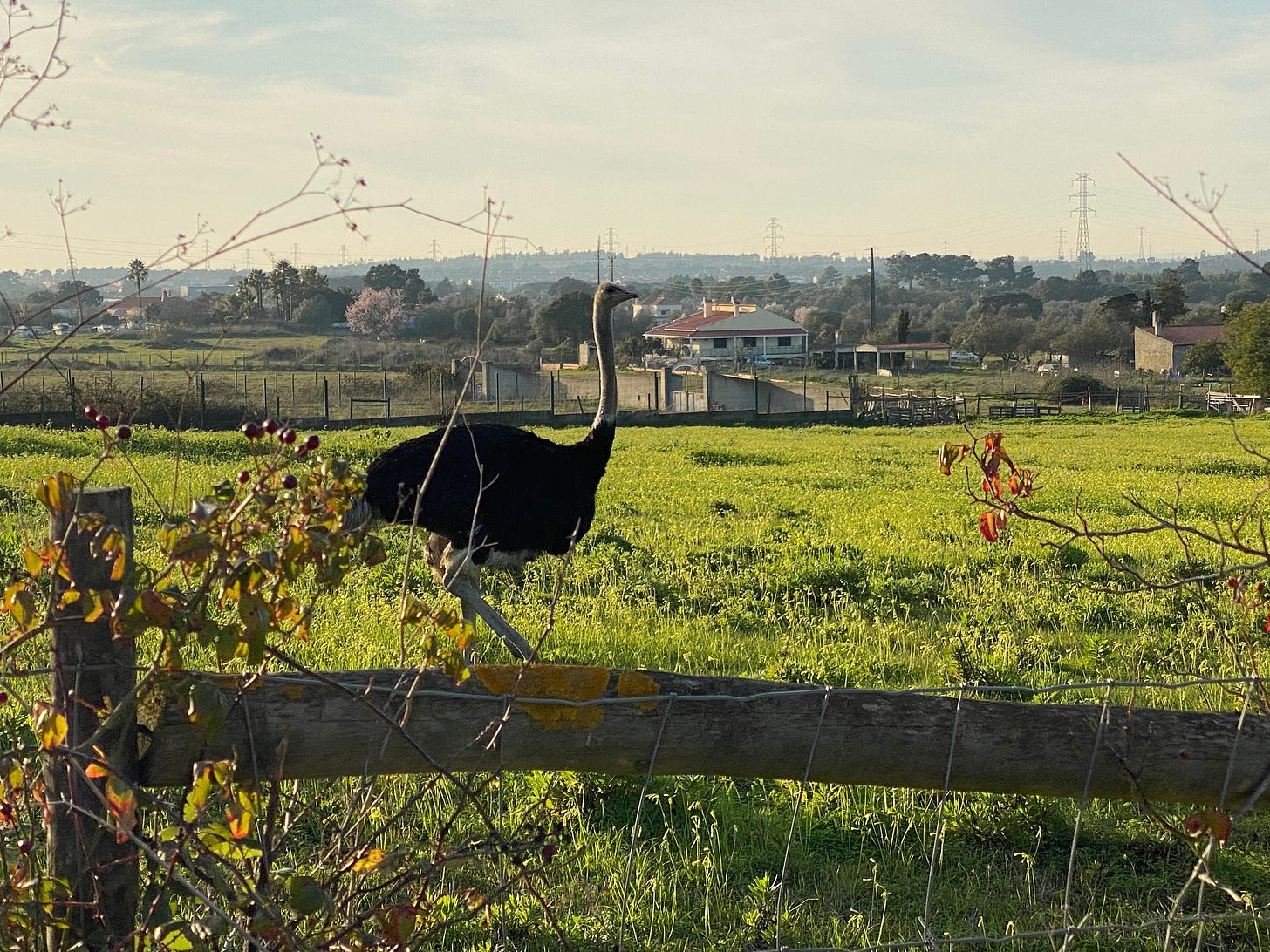

I look forward to these posts but this one hands down has to be my fave. Especially the piece about the former owner being a poet. Synchronicity.
Oh my gosh LaDonna.....CONGRATULATIONS!! What a beautiful story and a lovely new home. I'm so happy for you all!